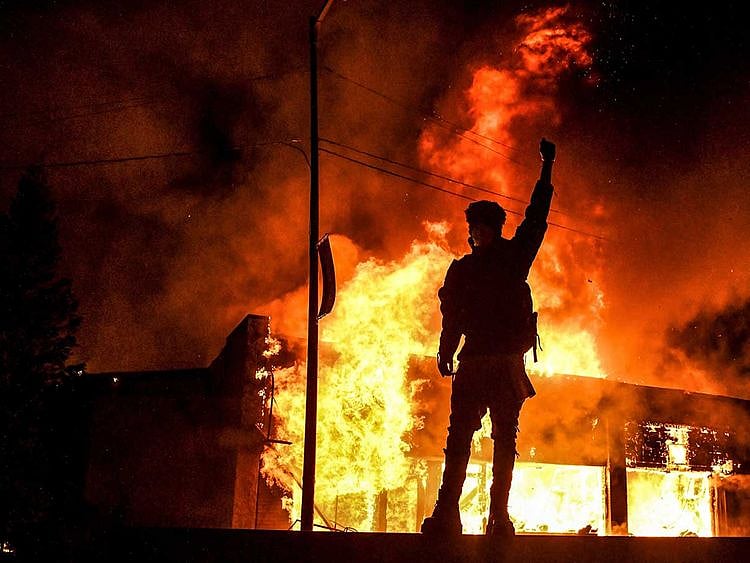Also In This Package
COVID-19: Reopened US theme parks adjust to new normal
World shows solidarity to protest George Floyd's death
China launches final satellite to rival GPS network
Look! Exclusive Mercedes-Maybach S 650 Night Edition
US Tech company reacts over work visa suspension
Meet the world's super rich power couples
History moves in mysterious ways, not so much when it concerns itself with describing past events as when it searches for general laws that govern their unfolding.
Consider some of these events in recent history. A Serb nationalist assassinates Austrian Archduke Franz Ferdinand and his wife during an official visit to the Bosnian capital of Sarajevo in June 1914 and he sparks a chain of events that lead two months later to World War One.
In December 1955, a Black seamstress defiantly refuses to give up her seat on a bus to a white passenger in Montgomery, Alabama, and helps initiate the civil rights movement in the United States.
A 26-year-old peddler in a provincial town in Tunisia immolates himself in December 2010 to protest the confiscation of his wares by corrupt local authorities and becomes the catalyst for the Arab Spring.
Worldwide protest movement
And late last month, during an arrest in Minneapolis, Minnesota, a white police officer kneels on the neck of a black suspect for nearly nine minutes, killing him while handcuffed and lying face down on the ground, an act of wanton cruelty that set off a nationwide — indeed, a worldwide — protest movement.
Neither these events nor the actors engaged in them are in and by themselves extraordinary. They become extraordinary, however, when seen as primary units of energy propelling transformative change in human affairs — change whose time had come.
In short, when something must give, it will, a phenomenon that social scientists call equifinality, as in the equifinality of night being inevitable day and that of life being inevitable death.
Murderous resentments
Yet, readers of Holy Texts — who always see the transcendental side of these of these affairs — will say that after oppression, injustice and bigotry have spread far and wide, the Deity intervenes, using His omnipotent means to command of man a renunciation of his murderous resentments.
Have your pick. Either way, there’s no doubt about the fact that Americans today are going through a dark journey of self-reckoning, as they question the grim actuality of their past and the uncertain potentiality of their future, an exercise that might, just might, define the intimate centre of their present, the tense of objective reality.
Once secure, even revered monuments symbolising smug ideas about race — ideas derived from the explicitly codified conviction that people of colour are an inferior species of men and women whose lives do not matter — are being defaced, trashed and toppled from coast to coast.
Even the Founding Fathers, slave-owners in their time, are being taken to task, along with recent presidents of the Republic.
Last Monday, in an opinion piece in the Washington Post, dealing with the legacy of Woodrow Wilson, the 28th president of the United States (d. 1924), Christopher L. Eisgruber, the president of Princeton University, led with this sentence: “The Princeton University Board of Trustees voted on Friday to remove Woodrow Wilson’s name from the university’s School of Public and International Affairs.
It acted because Wilson’s racist opinions and policies make him an inappropriate namesake for a school whose scholars, students and alumni must stand firmly against racism and for equality and justice”.
Gamut of villainy
Americans, unquestionably, appear bent on reckoning with that whole gamut of villainy that spans their history. And why should all this be important to us in the Arab world, indeed all of us around the world?
Clearly, no one need be reminded here that the US, certainly since the beginning of the second half of the last century, has been, along with its pernickety European allies playing second fiddle, “leader of the free world”, and its hegemonic reach has affected the very tenor of the global dialogue of cultures as well as the political destiny of many a nation, at times adversely. (Palestinians no doubt will nod bitterly reading this.)
Thus, as they say, when the US, as hegemon, sneezed, the rest of the world caught a cold, for Washington was (note the past tense) the epicentre of world power, power it often diffused at whim and at cost to others.
The coronavirus, a minuscule beast that measures one thousandth the width of an eyelash, has shut down the world — shut down travel, trade, investment, migration — with globalisation yielding to global distancing. So will the US, once the virus had been tamed, go back to the status quo ante and regain its swagger?
Doubtful, say those in the know at the Council on Foreign Relation in Washington. Multiple signs, they aver, point not only to the emergence of a more fragile international system but to the unravelling of American power itself.
But that unravelling also includes, alas, America’s progressive retreat, decline and fall as cultural icon to many around the world.
I say, along with Dylan Thomas, rage, rage, against the dying of the light.
— Fawaz Turki is a journalist, lecturer and author based in Washington. He is the author of The Disinherited: Journal of a Palestinian Exile.
Sign up for the Daily Briefing
Get the latest news and updates straight to your inbox
Network Links
GN StoreDownload our app
© Al Nisr Publishing LLC 2026. All rights reserved.
